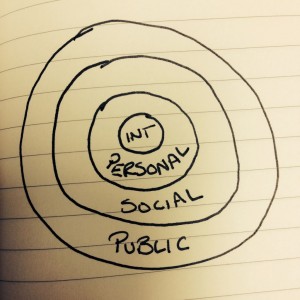That means that “extended family” is being built around our family’s mission, and that also means discipleship is taking place and discipleship takes access to and opening one’s life. Being available.
Here’s the thing though: I am an introvert.
It’s not an excuse; it’s just the truth of the matter. As much as I love people, they tire me out. I need down time. Like, literally, all-by-myself-time: to contemplate, to read, and sometimes to watch movies which makes fodder for future conversations. Whatever it is, that balance must be maintained if I’m going to function well. The interesting thing is that I’ve been talking to many introverts that are called to live Missional lifestyles, and that involves walking it out in community. Within that reality is giving people access to your life. I think it’s even amplified for leaders within the church who are starting to shift the culture of their church to a discipling culture (Missional Community/family on mission). The reality is that there is a sense that you are the shepherd of the entire flock, so does the invitation of access extend to everyone? I think it’s important to look at how Jesus did it.
I think we can see that Jesus specifically designed access to His life in a specific way – whether intentional or not (I think it was intentional). As a student of sociology, I tend to use sociological language to explain ideas. Here we can see something that Edward T. Hall communicated as “proxemics.” The idea is that human interaction is made up of a number of spaces: intimate (just a few people – whisper distance), personal space (4-15 people – generally, an area that facilitates close friends), social space (20-50 people – acquaintance area), and public space (70+ people – i.e. a public speaking setting). We see this play out in Jesus’ ministry as: intimate space (Peter, James and John), personal (the disciples), social space (the 72 who weren’t just part of the crowd, but were sent out two by two), and public (synagogues, the temple, teaching in crowded homes and streets). So, on top of seeing the way that Jesus would withdraw from the crowds and even the disciples to be alone, I think that it’s important to take note of the fact that He did not give everybody complete access to His life. In the same way, while leading Missional Community is leading mid-sized groups of people (social space) in Missional living, it’s important to recognize that we don’t have to give 20-50 people complete 24/7 access to our lives as leaders. We are giving access on different levels, but with intentionality. True, we invest in a few – giving them a high level of access, and we train those people to invest in others, and eventually we will have a culture of disciples who know how to raise up disciples. However, with that said, remember that the social space (the mid-sized group) is an integral part of being on mission, so there is access that we model there too – it just holds a different level of covenant relationship.
Access is both organized and organic
Jesus taught in formal settings (sermons, parables, teaching crowds at the same time as the disciples), as well as in personal conversations (teaching as He went, in life situations). In the same way, as we lead Missional Communities, we use an organized setting with our core leadership called “Huddle,” in which we learn to use diagnostic conceptual tools to relay biblical truths in a memorable and practical way, as well as hold each other accountable to doing the things that we feel that the Lord is telling us to do. However, this is only a part of access. To live a Missional life, we need to see how it is worked out in the home, in the workplace, and in everyday relationships. This is the organic part: giving others the kind of access that is needed to be able to imitate what it looks like to be a disciple.
A few practical ideas for creating organic access in a healthy way:
Pruning: It’s ok to say “no.” Living this way takes some rearranging, and even stopping to do things that are good and fun things, but life moves in seasons, and we can’t do everything. Living this way isn’t just adding more to your plate, it’s looking at your life and asking the question, “What is, or isn’t, bearing Kingdom fruit in my life?” If it isn’t bearing fruit (whether it is good or bad), it’s ok to cut it out of your schedule to create room for fruitfulness to take place.
Creating margin: If you want to create access, start by clearing your schedule. I know, life is so busy; however, don’t forget, being busy is also a choice. Joshua Becker has some good insight into this on his website Becoming Minimalist (CLICK HERE). And remember, creating margin slows us down, and when we slow down we can more easily hear the Lord lead us to speak into situations and the lives of other people.
Build access into your life: If you have hobbies (which I hope you do!), find ways to do them with others. If you have a full schedule, maybe it means creating space in your schedule by reserving one evening a week (or a couple times a month even) where your Huddle is welcomed to eat with your family. Maybe invite people to a movie night with your family, where the popcorn runneth over. You can get creative, but the point is instead of creating another “event” just develop the discipline of inviting those whom you are discipling to join you in life. Remember, your home doesn’t have to have a revolving door (an introvert’s nightmare), but you do need to figure out how you are going to create room for the access to happen.



